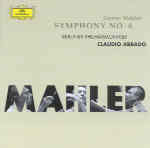In a blurb on the back of this CD jewel-case, the Financial Times refers to Claudio Abbado as “the high priest of Mahler.” The paper should stick to finance. Despite the fact that he continues to issue Mahler recordings on both CD (No. 2) and video (Nos. 5 and 9) like some sort of one-man assembly line, Abbado’s Mahler remains as variable as always. In his latest incarnation, he seems to have awakened somewhat from the stultifying dullness that characterized much of his Berlin tenure. It may be that his recent battle with cancer served as a call to attention in this respect, and I say this in all sincerity, wishing him continued good health and well-being as a person. The problem I have with him professionally, though, is that this doesn’t mean that everything he does is worthy of being preserved for all time, and there doesn’t seem to be anyone out there with the guts to tell him that.
The example at hand also demonstrates, as if more proof were needed, that the Berlin Philharmonic still has no business playing Mahler, as often as not, for this live Sixth remains a competent run-through that comes nowhere near delivering the expressive intensity that the music requires. Of course, the fault is just as much Abbado’s. Although he has obviously rethought his approach to the music (now placing the Andante second, and speeding up both inner movements by a couple of minutes as compared to his first, Chicago recording), the result isn’t more exciting than previously. It’s definitely lighter–though this isn’t exactly a work that cries out for that particular quality–and slightly more flowing. But this comes at a price, and a serious one: a debilitating lack of rhythmic articulation and dynamic range.
In the opening of the first movement, for example, you can’t tell that the strings are playing dotted rhythms. The brass playing is notably weak, particularly the trombones, and it’s further hampered by an annoying tendency to play every phrase diminuendo. This leaves odd “dead spots” in the texture, where the tension suddenly vaporizes. Thus, the coda of the first movement seldom has sounded so lacking in jubilation (the trumpets are just terrible here), while in the main sections of the scherzo there are moments where Abbado seems to entirely lose track of the melody. And so, despite the livelier tempos overall, the music plods. In the Andante, Abbado purchases his diaphanous pianissimos at the expense of weight of tone and texture, and the climax lacks anguish and urgency thanks to overly forward strings and the backwardly balanced winds and brass.
The damage is most serious in the finale, whose introduction evokes not a shred of terror. Gratuitous adjustments to the percussion, such as replacing suspended cymbals with plates, or adding a tam-tam to the first hammer-blow, contribute nothing of substance. What’s lacking is atmosphere and tension. All of the climaxes sound inhibited, particularly the recapitulation (the last 10 minutes or so). Heard in isolation, you might not notice much that’s amiss, but compare this to Bernstein/Vienna (DG), Chailly (Decca), Gielen (Hänssler), or any number of other versions, including Abbado’s own previous recording, and you will immediately hear a striking difference. Even Karajan’s somewhat weird version reveals an orchestra willing to play the music as if it matters. Under Abbado, the Berliners sound merely proficient, doing their jobs efficiently as usual–but they could be playing anything for all that they attempt to capture an idiomatic Mahler sound.
The live sonics seem honest, and it’s clear when listening, say, to the sweet tune in the finale that acts as a transition between the march and the sweeping second subject, that the feebleness of the wind playing is not a vagary of balance, but evidently part of Abbado’s new concept: “Mahler lite”. Certainly there’s room for fast, flowing versions of this symphony, but for that we have conductors like Kubelik (Audite) and Järvi (Chandos), who are even more exciting and who manage to give the music a much sharper rhythmic and dynamic profile than Abbado does here. The CD includes 24 seconds of applause–meaning, I presume, that the Berlin audience was convinced. So what else is new? You, I think it’s safe to say, won’t be.
































